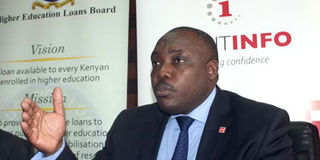State to double fund allocation to Helb

Higher Education Loans Board chief executive officer Charles Ringera speaks during the launch of a partnership with the Credit Reference Bureau in Nairobi on February 4, 2016. Allocation to Helb will be increased. PHOTO | NATION MEDIA GROUP
What you need to know:
- Mr Ruto said the funds would be accessible to students admitted to both public and private universities.
The government will from next year double its annual budgetary allocation to the Higher Education Loans Board (Helb) from Sh7.5 billion to Sh15 billion annually, in a bid to ensure that more students benefit from the funds.
In addition, all Helb beneficiaries will start enjoying a two-year grace period after graduating before they begin repaying their loans.
The announcement was made by Deputy President William Ruto on Friday during the 12th Mount Kenya University graduation ceremony at its main campus in Thika.
EMPLOYMENT
Mr Ruto said the funds would be accessible to students admitted to both public and private universities.
“There is absolutely no reason why students learning in private universities should not access government support in terms of education loans. From next year, we shall double the allocation,” he said.
Mr Ruto noted that the need to extend the grace period was informed by the realisation that many former students were having a hard time repaying their loans immediately after graduating due to lack of jobs.
“Sometimes we have had situations where graduands have been referred to the Credit Reference Bureau because of non-payments,” the DP said.
INTERNSHIP
The government will also be spending Sh15 billion annually to fund a graduates internship that is meant to prepare them for the job market or leverage their skills to enable them to create jobs for themselves.
The fully government sponsored internship will see graduates get a year or a year and a half’s internship in local companies.
JOB MARKET
Mr Ruto said the government had an elaborate plan geared towards enriching the country’s human capital.
“We want to deploy that human capital to the country’s advantage to take us into the future aside from our curriculum review that will align our education and training with job market demands and vision of moving the country into the future,” Mr Ruto said.





